Monday, December 2, 2024. Annette’s News Roundup.
What we can do to make the world better in 2025.
What can President Biden and other Elected Officials do?
Last night, President Biden took a giant and courageous step forward.
Last night, President Biden pardoned his son Hunter, with these words.👇
Today, I signed a pardon for my son Hunter.
From the day I took office, I said I would not interfere with the Justice Department’s decision-making, and I kept my word even as I have watched my son being selectively, and unfairly, prosecuted.
Without aggravating factors like use in a crime, multiple purchases, or buying a weapon as a straw purchaser, people are almost never brought to trial on felony charges solely for how they filled out a gun form. Those who were late paying their taxes because of serious addictions, but paid them back subsequently with interest and penalties, are typically given noncriminal resolutions.
It is clear that Hunter was treated differently. The charges in his cases came about only after several of my political opponents in Congress instigated them to attack me and oppose my election.
Then, a carefully negotiated plea deal, agreed to by the Department of Justice, unraveled in the courtroom — with a number of my political opponents in Congress taking credit for bringing political pressure on the process. Had the plea deal held, it would have been a fair, reasonable resolution of Hunter’s cases.
No reasonable person who looks at the facts of Hunter’s cases can reach any other conclusion than Hunter was singled out only because he is my son — and that is wrong.
There has been an effort to break Hunter — who has been five and a half years sober, even in the face of unrelenting attacks and selective prosecution. In trying to break Hunter, they’ve tried to break me — and there’s no reason to believe it will stop here.
Enough is enough. For my entire career I have followed a simple principle: just tell the American people the truth. They’ll be fair-minded.
Here’s the truth: I believe in the justice system, but as I have wrestled with this, I also believe raw politics has infected this process and it led to a miscarriage of justice — and once I made this decision this weekend, there was no sense in delaying it further. I hope Americans will understand why a father and a President would come to this decision.
Executive Grant of Clemency
Joseph R. Biden, Jr.
President of the United States of America
To All to Whom These Presents Shall Come, Greeting:
Be It Known, That This Day, I, Joseph R. Biden, Jr., President of the United States, Pursuant to My Powers Under Article II, Section 2, Clause 1, of the Constitution, Have Granted Unto
ROBERT HUNTER BIDEN
A Full and Unconditional Pardon
For those offenses against the United States which he has committed or may have committed or taken part in during the period from January 1, 2014 through December 1, 2024, including but not limited to all offenses charged or prosecuted (including any that have resulted in convictions) by Special Counsel David C. Weiss in Docket No. 1:23-cr-00061-MN in the United States District Court for the District of Delaware and Docket No. 2:23-CR-00599-MCS-1 in the United States District Court for the Central District of California.
IN TESTIMONY WHEREOF I have hereunto signed my name and caused the Pardon to be recorded with the Department of Justice.
Done at the City of Washington this 1st day of December in the year of our Lord Two Thousand and Twenty-four and of the Independence of the United States the Two Hundred and Forty-ninth.
Good for @JoeBiden. 👏🏼👏🏼👏🏼
— Ana Navarro-Cárdenas (@ananavarro) December 2, 2024
America elected a convicted felon.
That convicted felon pardoned his son-in-law’s father and appointed him Ambassador to France. If you support that, I don’t want to hear jack-shit about Biden pardoning his son. pic.twitter.com/NpcYGQjDWR
Pardon Hunter? GREAT.
— Keith Olbermann (@KeithOlbermann) December 2, 2024
Now pardon everybody else.
Every prosecutor, every Biden administration staffer, every media figure, everybody Trump will persecute.
10,000,000 pardons. At least.
And of course, from the criminal about to enter the White House.
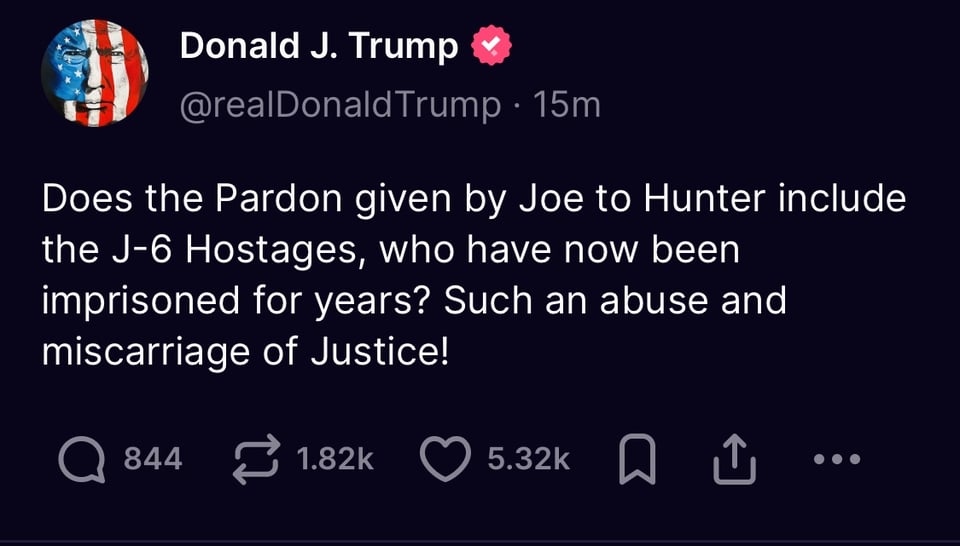
What else should the President do to thwart Trump’s criminal retaliations and actions?
The President has already met with Trump at the White House and promised his a smooth transition to the White House., even though Trump has violated the protocol that is required to assume the highest office in our land.
The Presidential Transition Act requires the president-elect to sign an ethics agreement that applies to everyone on the transition team and includes a pledge vowing to avoid conflicts of interest once sworn into office.
Only after the president-elect has signed the pledge and disclosed to the General Services Administration (GSA) all nonfederal contributions received for the transition, can their transition team receive access to federal agencies. (Source, Campaign Legal Center)
President Biden has welcomed Trump as the President-Elect though he has not complied with the law in place to earn a proper transition to power.
President Biden has also said that he and the First Lady will attend Trump’s inaugural.
Especially after January 6, 2020, the pull to have a peaceful transition of power is strong, but shouldn’t support for Democracy be stronger, Mr. President?
Is Trump a danger to Democracy or isn’t he? I dont mean to be too hyperbolic, Mr. President, but I am sure you would not have welcomed the comparably elected President of the Third Reich to the White House.
Dear Readers, perhaps you should call the White House and take a position on this? Should President Biden attend the inauguration? The choice is yours, as it is the President’s. Just as President Biden came to his senses last night and recognized that the circumstances required he pardon his son who was persecuted/prosecuted only because his name is Biden. Now he should recognize that circumstances surrounding this transition of power requires other than normal behavior.
The White House switchboard is at 202-456-1414 or the comments line is at 202-456-1111 during business hours. The President also can be reached [here.] (https://www.whitehouse.gov/contact/)
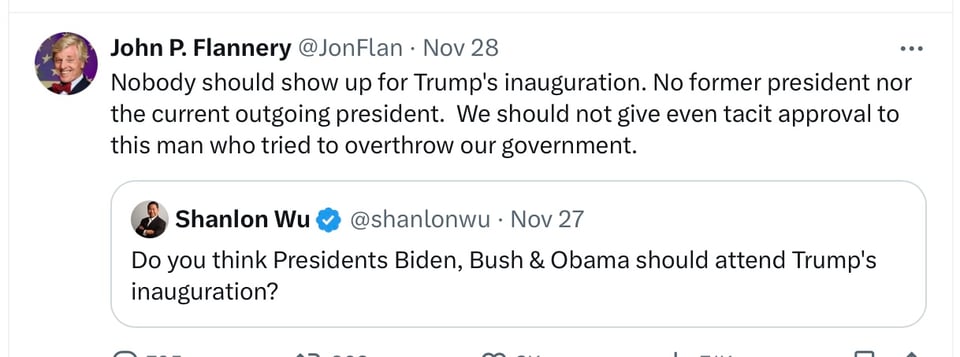
What else can be done to stop Trump?
With his 1.6% victory in the popular vote, Trump says he has a mandate. Don’t believe him.
The situation in the House makes clear he is teetering on the brink of losing on policies again and again. 216 to 219, with 218 needed to pass a bill.
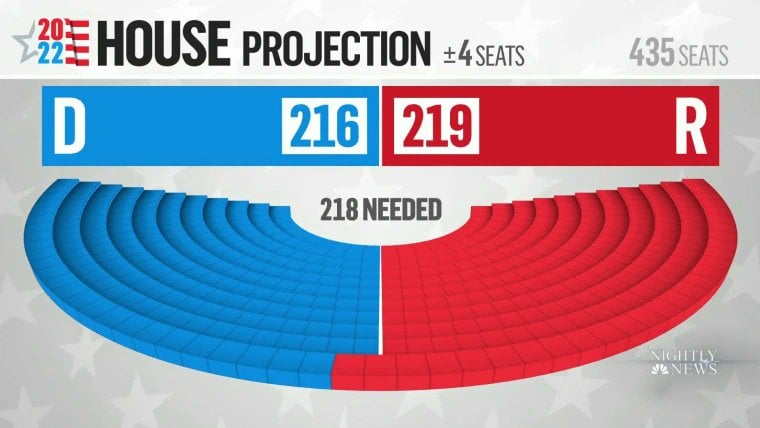
Do you think 218 Republicans will even show up to vote? What will happen when a red Rep drops out? Ready to win another special election.
What are other guard-rails to stop Trump?
You!
Stay on course, with renewed purpose – addressing issues affecting justice and Democracy with persistence and resilience.
Keep calling and annoying your Elected officials. Ask them to take actions aloud against Trump positions and appointments.
Be inspired by history. Embrace great historical moments when we as a nation have resisted and won. Gettysburg. D Day. We ended slavery. We stopped Hitler. Trump is a petty bully. We can minimize the damage he portends to do.
Get Republicans to help.
Watch Ronald Reagan. 👇
Ronald Reagan warned against “demagogues” like Trump:
— Republicans against Trump (@RpsAgainstTrump) November 30, 2024
“We should beware of the demagogues who are willing to declare a Trade war against our friends, weakening our economy, our national security, and the entire free world, all while cynically waving the American flag…” pic.twitter.com/bkblf8kUKE
The Supreme Court restrained Trump last time. Will it do so again.
Donald Trump’s greatest legacy is arguably the conservative supermajority he created on the Supreme Court. His second term could put him on a collision course with the institution he reshaped. With Republican allies controlling the House and Senate, the Supreme Court could emerge as the most likely check on the president-elect’s promise to assert sweeping powers — in ways that could test the boundaries of the law and the Constitution. If pursued, Trump’s controversial agenda to deport undocumented immigrants en masse, end birthright citizenship, impose extensive tariffs, fire or relocate thousands of federal workers and abolish the Department of Education would surely unleash a flood of legal challenges. Trump has lost at the Supreme Court more than any other modern president, according to one study, and several recent high court rulings that curbed the power of regulatory agencies could hem in his agenda. At the same time, Trump’s three nominees have moved the Supreme Court further to the right, establishing a supermajority that greatly expanded the definition of presidential immunity.
Legal scholars and advocates say they expect Trump to suffer additional legal setbacks in a second term, especially on his more extreme proposals. The biggest question, several said, is how far the justices would go in restraining Trump — and what Trump, who has denigrated courts and vowed to be a dictator for the first day of his second term, will do if he disagrees with a ruling.
“I don’t have any faith that the court is going to stand up to Trump in all cases,” said Steve Vladeck, a Georgetown University law professor who closely tracks the work of the court. “But I think it will stand up to him in some cases, and the question is then what?” Will the Trump administration comply with adverse Supreme Court decisions as it did during the first term, Vladeck asked. “Or are we going to see, the sort of break the glass conversations?” he said. “That to me is the real big picture question looming over the court right now.”
During Trump’s first term, he suffered a series of high-profile losses at the court. The justices initially refused to allow Trump to fully enact his proposed travel ban that barred some foreigners from entering the United States, blocked the administration’s efforts to put a citizenship question on the 2020 Census and rescind an Obama-era plan to protect young undocumented immigrants known as “dreamers” from deportation. Trump also lost a pair of disputes in 2020 over subpoenas from Congress and the Manhattan district attorney for Trump’s financial records.
In all, the Trump administration was unsuccessful in nearly 60 percent of its cases before the high court, according to an analysis by University of Southern California law professors Rebecca L. Brown and Lee Epstein. The defeats have prompted Trump to lash out at the court at times.
“Why would anybody be surprised that the Supreme Court has ruled against me, they always do!” Trump wrote on Truth Social in 2022 after the Supreme Court decided a congressional committee could obtain his tax returns. “Shame on them!”
But Trump will face a different court this time around, one that could be more amenable to his arguments. He placed three conservatives on the high court — Justices Neil M. Gorsuch, Brett M. Kavanaugh and Amy Coney Barrett, shifting the balance in many cases from a narrow 5-4 conservative majority to a 6-3 split.
The conservatives issued a sweeping ruling last term giving presidents broad immunity from criminal prosecution for official actions taken while in office, saying the protection from prosecution would ensure an energetic and independent president. Liberal Justice Sonia Sotomayor wrote in a scalding dissent that the president is “now a king above the law” in his official role and could, for example, order Navy SEALs to kill a rival without legal consequence.
“Trump is trying to shift the constitutional balance,” said Michael Waldman, president of the Brennan Center for Justice at NYU School of Law. “In the past, the Supreme Court has pushed back. This Supreme Court should, but it’s an open question of whether it will.”
Chief Justice John G. Roberts Jr. could play a pivotal role. During Trump’s first term, Roberts often joined the four liberal justices in ruling against the president’s initiatives. In the last term, Roberts sided with his fellow conservatives in the high-profile cases that divided the court along ideological lines.
“Part of what happened is that Roberts has shifted to the right to be relevant,” said Kermit Roosevelt, a University of Pennsylvania law professor. “Roberts doesn’t like to be in dissent; he likes to be in charge as much as he can.” Many details of Trump’s plans have yet to be sketched out, so it’s difficult to analyze their legality or how the Supreme Court might rule on them, some conservative law professors said. Trump has failed to act on many of his bolder pledges in the past, and some of his initiatives were nixed by the courts for not following rulemaking procedures.
Jonathan H. Adler, a professor at Case Western Reserve, pointed out the Supreme Court has significantly limited the power of federal agencies in recent terms, which could put a brake on Trump’s agenda. In one major 2022 ruling, the court required federal agencies to have clear authorization from Congress when making politically or economically significant regulations. In the other, this June, the court did away with a 40-year-old precedent that had required courts to defer to how agencies implement laws in areas where Congress has not given explicit guidance.
“The court has made clear it’s going to enforce certain types of constraints on federal power,” Adler said. “That could certainly constrain the ability of the Trump administration to advance policies by executive fiat, just as it constrained the Biden administration.”
Adler said one caveat is that courts have given presidents wider latitude to act in two areas that particularly interest Trump — trade and immigration. Even so, Adler said Trump’s pledge of massive tariffs on some imported goods could test the limits of his authority.
Elon Musk and Vivek Ramaswamy, whom Trump has tasked with shrinking the federal government through a new, advisory “Department of Government Efficiency,” have said they would use the recent Supreme Court rulings as a road map to identify regulations that Trump could kill.
Other Trump proposals could face legal obstacles, including his promise to end birthright citizenship, which courts have long interpreted as guaranteed by the 14th Amendment. “I think it has less than zero chance,” said Clark Neily, the senior vice president for legal studies at the libertarian Cato Institute. “We’re not going to amend the Constitution to eliminate that provision, and that’s what it would take.”
As president, Trump could also attempt untested applications of dusty laws. He has said he would invoke the Alien Enemies Act of 1798 to round up immigrants and the Insurrection Act of 1807 to use the military to crack down on protests. Trump has pledged to reclassify thousands of federal workers — a process known as Schedule F — making it easier to fire them, and to move up to 100,000 federal employees out of the D.C. area.
Donald Moynihan, a professor of public policy at the University of Michigan who has studied Schedule F, said Trump’s move may go beyond the scope of the law governing the civil service and rests on a novel reading of its powers. “I don’t believe the intention of Congress when passing the Civil Service Reform Act was to give presidents expansive new appointment powers like Schedule F,” Moynihan said.
Federal workers’ unions have pledged to mount vigorous legal challenges to Schedule F, and the Biden administration has enacted new safeguards for workers that would make it more difficult to strip their protections. Still, some experts thought courts might uphold a Schedule F effort. “There is the case that the Schedule F proponents will make that … the current civil service laws give the president broad power to create new schedules and move feds into them; and that the founders intended for the president to have broad dismissal power,” said Donald F. Kettl, former University of Maryland dean and professor of public policy. (Washington Post)
As to more of Trump’s unsuitable and sometimes dangerous intended nominees… Know them. Stop them.
Kash Patel Will Do Anything for Trump - The Atlantic.)
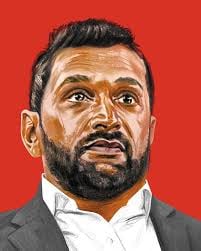
This article 👆 is a must-read. I was unable to copy it here (computer madness) but I encourage you to click on the link above and read about Kash Patel, who is arguably crazy as well as crooked.
He is Trump’s choice for FBI Director, being put in that position to carry out the retaliations he has long joined Trump in promising.
It seems unlikely that Patel will be confirmed by the Senate. The consensus seems to be Trump will probably fire the current head of the FBI, Christopher Wray, and make Patel Acting Head of the FBI, where he can serve for 200 days, just enough time to do serious damage to Democracy.
Even so, call your Senatorsand demand he not be confirmed. Put them on notice, those who elected them are watching. Your call will matter as the Senators take the temperature of the voters.
—— ——
Then there is Peter Hegseth, the Fox News broadcaster Trump thinks should head the Department of Defense.
When you call about Patel, you might mention what Hegseth’s mother wrote about him.
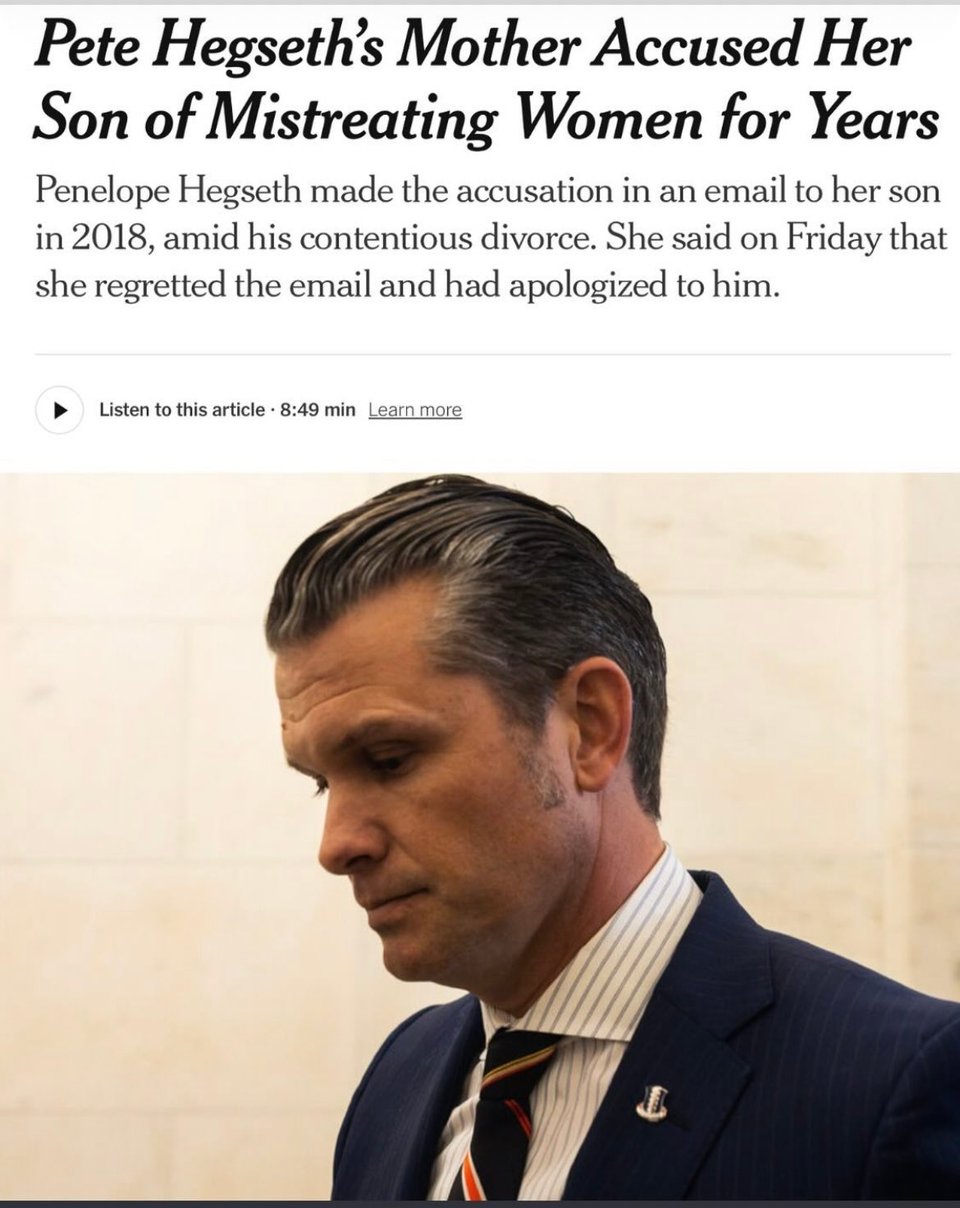
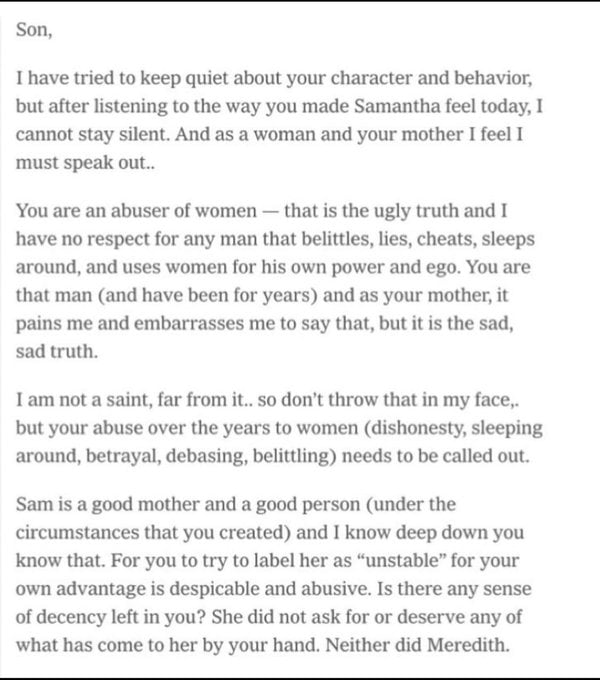

One more thing.
🚨Keith Olbermann says “Never address Trump as President. He is Trump, just Trump. Never President”
— Donald J. Trump News (@realTrumpNewsX) November 15, 2024
What’s your message? pic.twitter.com/EDT9eJymsz
Should we always say Trump, not President Trump?
My position - I won’t ever say President Trump.
You can take a position on this too.
Remembering Thanksgiving 2024.
Look over your shoulder and see Thanksgiving 2024. I hope yours was abundant and comforting in such stressful times.
Here are other look-backs at the holiday weekend gone by.
Biden stresses gratitude while Trump targets enemies in Thanksgiving messages.
President-elect Trump used Thanksgiving as an opportunity to attack "Radical Left Lunatics" while outgoing President Biden emphasized gratitude in his final holiday message as president.
Why it matters: Trump made punishing "enemies within" central to his reelection bid, which saw Republicans rewarded with control of both chambers of Congress and the presidency.
Trump's Thanksgiving message shows he feels no need to strike a more conciliatory tone as he returns to the White House.
Biden has promised Trump a peaceful transition of power, while Trump has vowed to roll back many of the Biden administration's achievements.
State of play: "Happy Thanksgiving, America. May we use this moment to take time from our busy lives and focus on what matters most: our families, our friends, our neighbors, and the fact that we've been blessed to live in America, the greatest country on Earth," Biden wrote on X Thursday.
In a separate video message, he said he and First Lady Jill Biden were "grateful for the trust you put in us these past four years."
"It's been the honor of our lives to serve you in the White House," he added.
The other side: In contrast to Biden's nonpartisan message, Trump took time in his Thanksgiving message to boast about his "landslide victory" in November.
"Happy Thanksgiving to all, including to the Radical Left Lunatics who have worked so hard to destroy our Country, but who have miserably failed," Trump wrote on Truth Social Thursday.
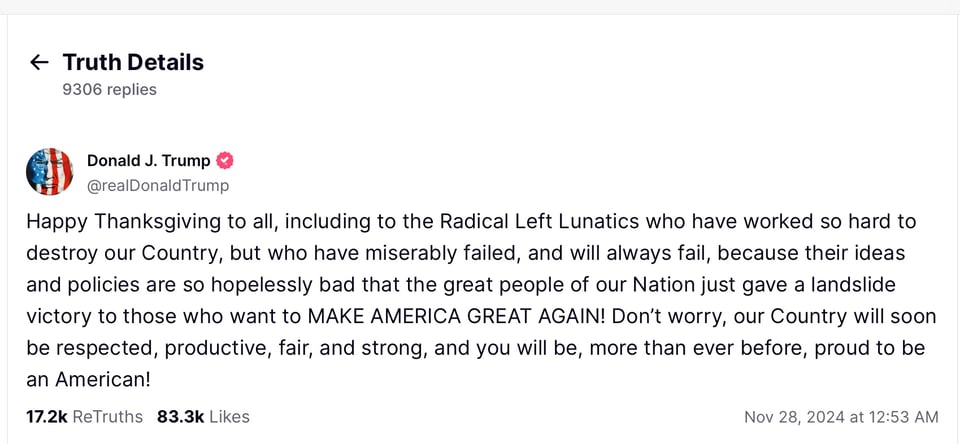
He also offered a separate Thanksgiving post of a photo of himself with a law enforcement officer.
(Axios)
J D Vance proves he is nuts, as well as obsequious and weird.
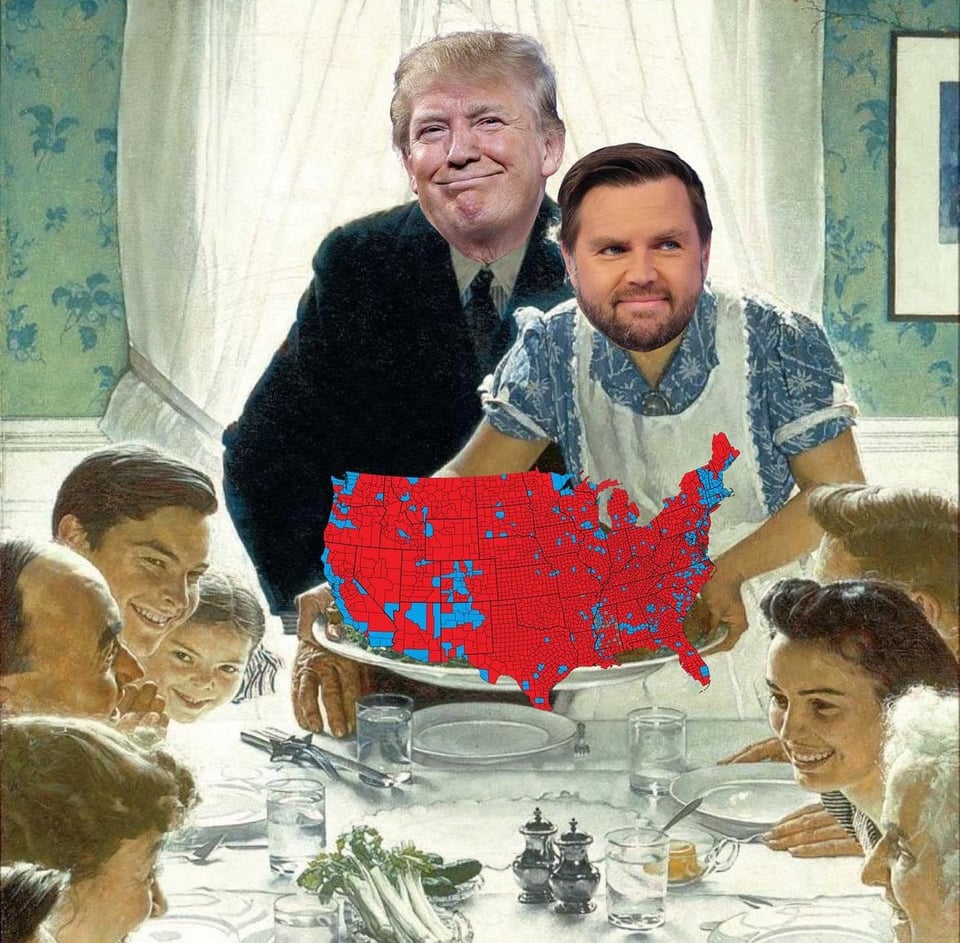
What a real President and Vice President do on Thanksgiving.
.@POTUS and @FLOTUS deliver pumpkin pies and visit with firefighters in Nantucket on Thanksgiving Day. pic.twitter.com/ztwM1vrf0a
— Jeff Mason (@jeffmason1) November 28, 2024
Thanksgiving is about giving thanks for what we have and giving back to our communities. Our family was grateful to be back at DC Central Kitchen to volunteer for the holiday. pic.twitter.com/e47hYpqbAE
— Vice President Kamala Harris (@VP) November 28, 2024
@POTUS Indigenous history is defined by strength, survival, and a deep pride in heritage.
Today, on Native American Heritage Day, we celebrate that rich story. And recommit to working with Tribal Nations and Native communities to bring new prosperity and security to Native peoples.

Sometimes, History brings out the best in people.
Today, we honor the historic legacy of Shirley Chisholm on her 100th birthday.
— James E. Clyburn (@RepJamesClyburn) November 30, 2024
As the first Black woman elected to Congress and to run for president, she represented the realization of a dream, and the hope for a better tomorrow. Her legacy burns bright and her example will… pic.twitter.com/S10kwyV52P
Nearly 70 years ago today, Rosa Parks' refusal to give up her bus seat changed history. As a state representative, I authored legislation making Ohio the first state to recognize Rosa Parks Day. Join me Dec. 13th as we honor her legacy and consider our path forward. RSVP 👉🏽… pic.twitter.com/jFyomswY9x
— Rep. Joyce Beatty (@RepBeatty) December 1, 2024
Amazing news on World AIDS Day.
First the President.
On World AIDS Day, the Biden-Harris Administration honors the memory of those we have lost to HIV/AIDS and celebrates the remarkable strength of the over one million Americans who continue to live and thrive with HIV. pic.twitter.com/ft5BU5Bmsn
— The White House (@WhiteHouse) December 2, 2024
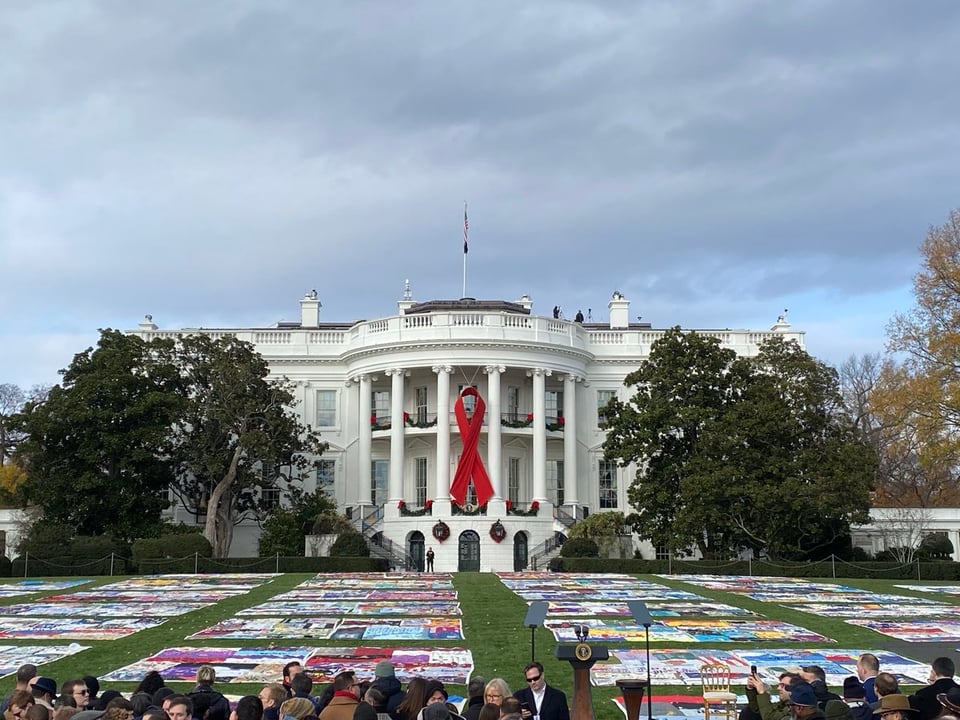
Then, an astonishing discovery.
No coverage that I could see in the New York Times.
A twice-yearly shot could help end AIDS. But will it get to everyone who needs it?
It’s been called the closest the world has ever come to a vaccine against the AIDS virus.
The twice-yearly shot was 100% effective in preventing HIV infections in a study of women, and results published Wednesday show it worked nearly as well in men.
Drugmaker Gilead said it will allow cheap, generic versions to be sold in 120 poor countries with high HIV rates — mostly in Africa, Southeast Asia and the Caribbean. But it has excluded nearly all of Latin America, where rates are far lower but increasing, sparking concern the world is missing a critical opportunity to stop the disease.
“This is so far superior to any other prevention method we have, that it’s unprecedented,” said Winnie Byanyima, executive director of UNAIDS. She credited Gilead for developing the drug, but said the world’s ability to stop AIDS hinges on its use in at-risk countries.
In a report issued to mark World AIDS Day on Sunday, UNAIDS said that the number of AIDS death last year — an estimated 630,000 — was at its lowest since peaking in 2004, suggesting the world is now at “a historic crossroads” and has a chance to end the epidemic.
The drug called lenacapavir is already sold under the brand name Sunlenca to treat HIV infections in the U.S., Canada, Europe and elsewhere. The company plans to seek authorization soon for Sunlenca to be used for HIV prevention.
While there are other ways to guard against infection, like condoms, daily pills, vaginal rings and bi-monthly shots, experts say the Gilead twice-yearly shots would be particularly useful for marginalized people often fearful of seeking care, including gay men, sex workers and young women.
“It would be a miracle for these groups because it means they just have to show up twice a year at a clinic and then they’re protected,” said UNAIDS’ Byanyima.
Such was the case for Luis Ruvalcaba, a 32-year-old man in Guadalajara, Mexico, who participated in the latest published study. He said he was afraid to ask for the daily prevention pills provided by the government, fearing he would be discriminated against as a gay man. Because he took part in the study, he'll continue to receive the shots for at least another year.
“In Latin American countries, there is still a lot of stigma, patients are ashamed to ask for the pills,” said Dr. Alma Minerva Pérez, who recruited and enrolled a dozen study volunteers at a private research center in Guadalajara.
How widely available the shots will be in Mexico through the country's health care system isn't yet known. Health officials declined to comment on any plans to buy Sunlenca for its citizens; daily pills to prevent HIV were made freely available via the country’s public health system in 2021.
"If the possibility of using generics has opened, I have faith that Mexico can join,” said Pérez.
Byanyima said other countries besides Mexico that took part in the research were also excluded from the generics deal, including Brazil, Peru and Argentina. “To now deny them that drug is unconscionable.” she said.
In a statement, Gilead said it has “an ongoing commitment to helping enable access to HIV prevention and treatment options where the need is the greatest.” Among the 120 countries eligible for generic version are 18 mostly African countries that comprise 70% of the world’s HIV burden.
The drugmaker said it is also working on establishing “fast, efficient pathways to reach all people who need or want lenacapavir for HIV prevention.”
On Thursday, 15 advocacy groups in Peru, Argentina, Ecuador, Chile, Guatemala and Colombia wrote to Gilead, asking for generic Sunlenca to be made available in Latin America, citing the “alarming” inequity in access to new HIV prevention tools while infection rates were rising.
While countries including Norway, France, Spain and the U.S. have paid more than $40,000 per year for Sunlenca, experts have calculated it could be produced for as little as $40 per treatment once generic production expands to cover 10 million people.
Dr. Chris Beyrer, director of the Global Health Institute at Duke University, said it will be enormously useful to have Sunlenca available in the hardest-hit countries in Africa and Asia. But he said the rising HIV rates among groups including gay men and transgender populations constituted “a public health emergency” in Latin America.
Hannya Danielle Torres, a 30-year-old trans woman and artist who was in the Sunlenca study in Mexico, said she hoped the government would find a way to provide the shots. “Mexico may have some of the richest people in the world but it also has some of the most vulnerable people living in extreme poverty and violence,” Torres said.
Another drugmaker, Viiv Healthcare, also left out most of Latin America when it allowed generics of its HIV prevention shot in about 90 countries. Sold as Apretude, the bi-monthly shots are about 80% to 90% effective in preventing HIV. They cost about $1,500 a year in middle-income countries, beyond what most can afford to pay.
Asia Russell, executive director of the advocacy group Health Gap, said that with more than 1 million new HIV infections globally every year, established prevention methods are not enough. She urged countries like Brazil and Mexico to issue “compulsory licenses,” a mechanism where countries suspend patents in a health crisis.
It’s a strategy some countries embraced for previous HIV treatments, including in the late 1990s and 2000s when AIDS drugs were first discovered. More recently, Colombia issued its first-ever compulsory license for the key HIV treatment Tivicay in April, without permission from its drugmaker, Viiv.
Dr. Salim Abdool Karim, an AIDS expert at South Africa's University of KwaZulu-Natal, said he had never seen a drug that appeared to be as effective as Sunlenca in preventing HIV.
“The missing piece in the puzzle now is how we get it to everyone who needs it,” he said. (Associated Press).